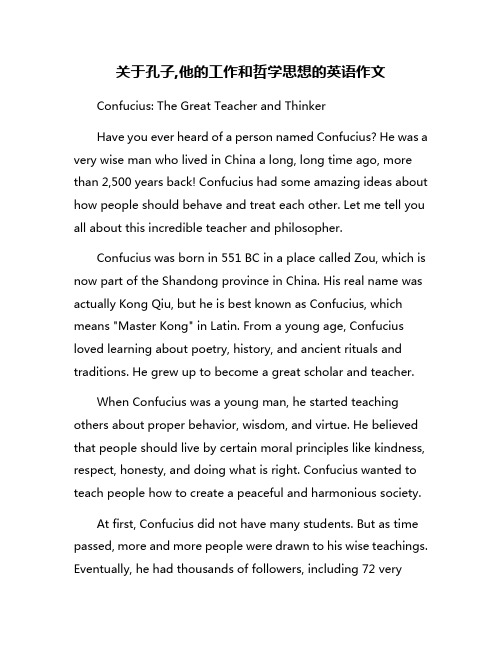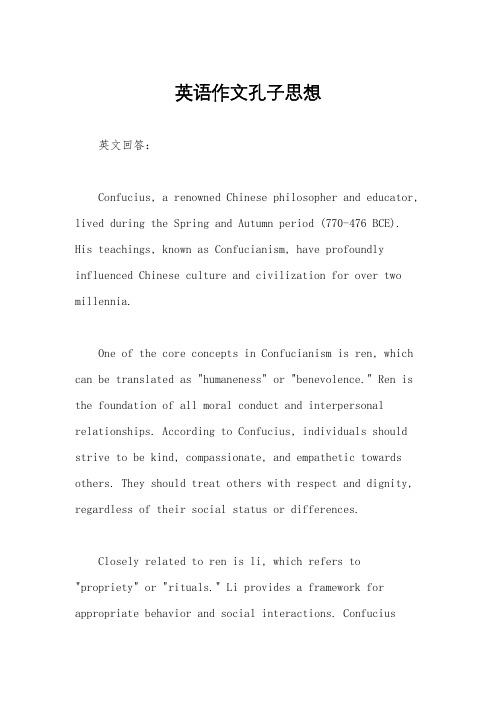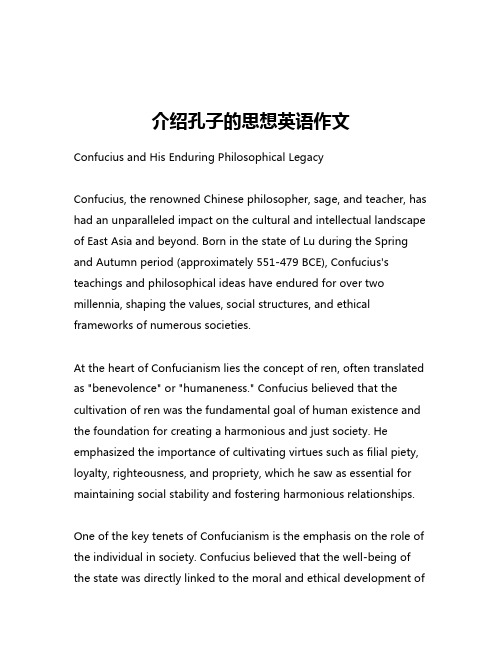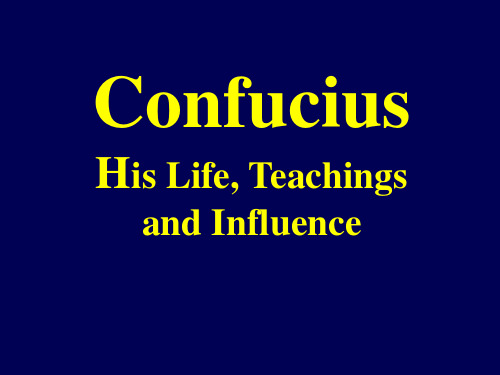介绍孔子的哲学思想外教口语考试(英文版)
关于孔子,他的工作和哲学思想的英语作文

关于孔子,他的工作和哲学思想的英语作文Confucius: The Great Teacher and ThinkerHave you ever heard of a person named Confucius? He was a very wise man who lived in China a long, long time ago, more than 2,500 years back! Confucius had some amazing ideas about how people should behave and treat each other. Let me tell you all about this incredible teacher and philosopher.Confucius was born in 551 BC in a place called Zou, which is now part of the Shandong province in China. His real name was actually Kong Qiu, but he is best known as Confucius, which means "Master Kong" in Latin. From a young age, Confucius loved learning about poetry, history, and ancient rituals and traditions. He grew up to become a great scholar and teacher.When Confucius was a young man, he started teaching others about proper behavior, wisdom, and virtue. He believed that people should live by certain moral principles like kindness, respect, honesty, and doing what is right. Confucius wanted to teach people how to create a peaceful and harmonious society.At first, Confucius did not have many students. But as time passed, more and more people were drawn to his wise teachings. Eventually, he had thousands of followers, including 72 verydevoted students who studied with him constantly. Confucius traveled all around China, sharing his ideas with rulers and common people alike.So what were some of Confucius' most important teachings? One of his main beliefs was that everyone should follow the principle of "ren," which means showing kindness, compassion, and care for others. He taught that we should treat others the same way we wish to be treated ourselves. Doesn't that sound like a wonderful way to live?Confucius also greatly valued education and learning. He said that we should never stop trying to gain more knowledge and improve ourselves. He thought that studying history, literature, poetry, and rituals could help make us wiser and more virtuous people.Another key idea from Confucius was about having good relationships and behavior. He emphasized the importance of showing respect and being obedient, especially to one's parents, elders, and rulers. He believed that if everyone understood their proper roles and acted accordingly, society would be more stable and harmonious.Confucius didn't just teach philosophy though - he also worked as a government official for many years. He helpedintroduce new policies and systems that made the state and its people more prosperous and well-organized. His wisdom in governing impressed many leaders at that time.Although Confucius lived a very long life, he didn't actually write down his teachings himself. Luckily, his devoted students carefully recorded all of his words and lessons. These writings make up an important collection of books called the Analects, which preserve Confucius' brilliant philosophy for us today.The ideas of Confucius had an enormous influence across East Asia for centuries after his death in 479 BC. His thoughts on morality, relationships, education, and good governance shaped the cultures of many countries like China, Korea, Japan, and Vietnam. Even today, over 2,500 years later, Confucianism continues to be highly respected and studied around the world.Confucius is considered one of the most important and influential philosophers in human history. With his simple yet profound principles for living an ethical life, he helped shape the thoughts and behaviors of billions of people across many generations. His wisdom about virtue, kindness, respect, and striving for knowledge is just as meaningful now as it was centuries ago.The next time you are facing a difficult choice about how to act, just think - what would the great teacher Confucius do? By following his examples of righteousness, humility, and always trying to be a better person, we can create a kinder and more harmonious world, just like Confucius envisioned so long ago.。
英语作文孔子思想

英语作文孔子思想英文回答:Confucius, a renowned Chinese philosopher and educator, lived during the Spring and Autumn period (770-476 BCE). His teachings, known as Confucianism, have profoundly influenced Chinese culture and civilization for over two millennia.One of the core concepts in Confucianism is ren, which can be translated as "humaneness" or "benevolence." Ren is the foundation of all moral conduct and interpersonal relationships. According to Confucius, individuals should strive to be kind, compassionate, and empathetic towards others. They should treat others with respect and dignity, regardless of their social status or differences.Closely related to ren is li, which refers to "propriety" or "rituals." Li provides a framework for appropriate behavior and social interactions. Confuciusbelieved that adhering to established social norms and customs promoted harmony and order within society. However, he also emphasized that li should not be rigid or oppressive, but should be adaptable to changing circumstances and contexts.Another important aspect of Confucianism is xiao, or "filial piety." Xiao is the virtue of respecting and honoring one's parents and ancestors. Confucius taught that children should obey and care for their parents, and in turn, parents should provide guidance and support to their children. Xiao extends beyond the immediate family toinclude extended family members, such as grandparents and siblings.Confucianism also places great importance on education. Confucius believed that education was essential forpersonal and societal development. He established a private school where he taught students from all social backgrounds. Confucius's teachings focused on the cultivation of virtue, morality, and intellectual inquiry.Confucianism has had a profound impact on Chinese culture and society. It has shaped Chinese values, social norms, and political systems. Confucian ideals of harmony, respect for authority, and education have been instrumental in maintaining societal stability and promoting cultural continuity.In addition to its influence in China, Confucianism has also spread to other parts of East Asia, including Korea, Japan, and Vietnam. It has influenced the development of social and ethical systems in these countries and has contributed to the formation of a shared cultural heritage in the region.中文回答:孔子是一位著名的中国哲学家和教育家,生活在春秋时期(公元前 770-476 年)。
介绍孔子的思想英语作文

介绍孔子的思想英语作文Confucius and His Enduring Philosophical LegacyConfucius, the renowned Chinese philosopher, sage, and teacher, has had an unparalleled impact on the cultural and intellectual landscape of East Asia and beyond. Born in the state of Lu during the Spring and Autumn period (approximately 551-479 BCE), Confucius's teachings and philosophical ideas have endured for over two millennia, shaping the values, social structures, and ethical frameworks of numerous societies.At the heart of Confucianism lies the concept of ren, often translated as "benevolence" or "humaneness." Confucius believed that the cultivation of ren was the fundamental goal of human existence and the foundation for creating a harmonious and just society. He emphasized the importance of cultivating virtues such as filial piety, loyalty, righteousness, and propriety, which he saw as essential for maintaining social stability and fostering harmonious relationships.One of the key tenets of Confucianism is the emphasis on the role of the individual in society. Confucius believed that the well-being of the state was directly linked to the moral and ethical development ofits citizens. He advocated for a system of meritocratic governance, where individuals were selected for positions of power based on their moral character and intellectual abilities, rather than their social status or wealth.Confucius's teachings also place a strong emphasis on the importance of education and self-cultivation. He believed that through the study of the classics, the cultivation of virtues, and the practice of self-reflection, individuals could become sages and moral exemplars, capable of leading and guiding society. This emphasis on education and self-improvement has had a lasting impact on the educational systems and cultural values of East Asian societies.Another key aspect of Confucianism is its focus on the importance of social relationships and the cultivation of harmonious interpersonal dynamics. Confucius believed that the family was the fundamental unit of society and that the proper ordering of familial relationships was essential for the stability and well-being of the state. He emphasized the importance of filial piety, the respect and care for one's parents and elders, as well as the importance of maintaining proper social roles and hierarchies.Confucianism also places a strong emphasis on the concept of the "Mandate of Heaven," the belief that political authority and legitimacy are derived from the mandate of the divine or cosmicorder. This belief has had a profound impact on the political and social structures of East Asian societies, where the ruler was seen as the intermediary between the people and the divine.Despite the enduring influence of Confucianism, it has also faced significant challenges and criticisms over the centuries. Some have argued that the emphasis on social hierarchy and the rigid adherence to social roles can be oppressive and limit individual freedom. Others have criticized the patriarchal nature of Confucian thought and its potential to reinforce gender inequality.In recent decades, however, there has been a renewed interest in Confucian thought, as scholars and thinkers have sought to reinterpret and adapt its teachings to address the challenges of the modern world. Many have argued that Confucianism's emphasis on social harmony, ethical cultivation, and the importance of education and self-improvement can offer valuable insights and solutions to the complex problems facing contemporary societies.In conclusion, Confucius's philosophical legacy continues to exert a profound influence on the cultural, social, and political landscape of East Asia and beyond. His teachings on the cultivation of virtue, the importance of social relationships, and the role of the individual in society have had a lasting impact on the way we think about human nature, ethics, and the organization of society. As we navigate thechallenges of the modern world, the timeless wisdom of Confucianism may offer valuable insights and guidance for building a more just, harmonious, and fulfilling world.。
孔子及其思想介绍英语作文

孔子及其思想介绍英语作文下载温馨提示:该文档是我店铺精心编制而成,希望大家下载以后,能够帮助大家解决实际的问题。
文档下载后可定制随意修改,请根据实际需要进行相应的调整和使用,谢谢!并且,本店铺为大家提供各种各样类型的实用资料,如教育随笔、日记赏析、句子摘抄、古诗大全、经典美文、话题作文、工作总结、词语解析、文案摘录、其他资料等等,如想了解不同资料格式和写法,敬请关注!Download tips: This document is carefully compiled by theeditor. I hope that after you download them,they can help yousolve practical problems. The document can be customized andmodified after downloading,please adjust and use it according toactual needs, thank you!In addition, our shop provides you with various types ofpractical materials,such as educational essays, diaryappreciation,sentence excerpts,ancient poems,classic articles,topic composition,work summary,word parsing,copyexcerpts,other materials and so on,want to know different data formats andwriting methods,please pay attention!Confucius, also known as Kongzi, was a Chinese philosopher who lived during the Spring and Autumn period. He was born in 551 BC and is considered one of the most influential thinkers in Chinese history.Confucius believed in the importance of moral values and ethics. He emphasized the concept of "ren," which can be translated as "benevolence" or "humaneness." According to Confucius, ren is the foundation of a harmonious society and should be practiced by all individuals.In addition to ren, Confucius also emphasized the importance of filial piety. He believed that children should respect and honor their parents, and that thisfilial piety is the basis for a well-functioning society.Confucius also believed in the concept of "junzi," which can be translated as "gentleman" or "noble person." According to Confucius, a junzi is someone who embodiesmoral virtues and strives to be a good person. He believed that anyone, regardless of their social status, can becomea junzi through self-cultivation and education.Education was a central aspect of Confucius' philosophy. He believed that education is the key to personal and societal development. Confucius emphasized the importanceof learning and self-improvement, and he believed that individuals should constantly seek to expand their knowledge and understanding of the world.Confucius' teachings had a profound impact on Chinese society and culture. His philosophy shaped the moral and ethical values of the Chinese people, and his ideascontinue to be influential today.In conclusion, Confucius was a Chinese philosopher who emphasized the importance of moral values, filial piety,and education. His teachings continue to shape Chinese society and culture, and his ideas on ethics and personal development are still relevant in today's world.。
Talk-on-Confucius孔子英文介绍(1)

II. Confucius’ Teachings
1. A believer of Heaven but not a religious founder and leader, often avoiding talking about religious subjects
2. Confucianism, though treated by some people as a sort of religion, having nothing to do with religion
I. Confucius’ Life
Confucius’ own comment on his life:
The Master said, “At fifteen I bent my mind on
learning. At thirty, I was firmly established. At forty,
Chinese character of ren:
a. Ren, denoting good relationship between two persons or among people, harmonious human relations.
Confucius on ren:
“Do not do to others what you do not want others to do to you. This is ren.” (cf. Kant’s saying)
The fundamental quality of man, the highest standard of one’s morals
3) How to acquire ren?
Confucius said, “Is ren far away? No. If I aspire for ren it is right here!” The achievement of ren is in our own hand.
介绍孔子思想的英语作文

介绍孔子思想的英语作文Confucius, also known as Kong Zi, was a Chinese philosopher who lived in the Spring and Autumn period. 孔子,也被称为孔子,是生活在春秋时期的中国哲学家。
He is widely considered to be one of the most influential thinkers in Chinese history. 他被普遍认为是中国历史上最具影响力的思想家之一。
His teachings and philosophy have had a lasting impact on Chinese culture and society. 他的教导和哲学对中国文化和社会产生了持久的影响。
Confucius' thoughts revolve around the importance of moral values, personal development, and social harmony. 孔子的思想围绕着道德价值观、个人发展和社会和谐的重要性展开。
One of the key concepts in Confucius' philosophy is the idea of Ren, which can be translated as benevolence or humaneness. 孔子哲学中的一个关键概念是仁,可以翻译为仁爱或人心。
He believed that cultivating a sense of compassion and empathy towards others is essential for creating a harmonious and well-functioning society. 他认为培养对他人的同情和共情感是创造和谐和良好运行社会的关键。
介绍孔子的英语作文范文
Confucius: The Sage of Eastern WisdomConfucius, the great philosopher and educator of ancient China, stands as a towering figure in the history of Eastern civilization. Born in the late Spring and Autumn Period, Confucius, whose original name was Kong Qiu, lived in an era of political unrest and social transformation. Despite the challenges of his time, he dedicated his life to the pursuit of wisdom, morality, and education, leaving a legacy that has influenced generations of Chinese and beyond.Confucius's philosophy, known as Confucianism, emphasizes the importance of harmony, respect, and benevolence. He advocated the idea of "ren" (humaneness), which emphasized kindness, compassion, and the welfare of others. He also stressed the virtues of loyalty, filial piety, and righteousness, believing that these qualities were essential for building a just and harmonious society. One of Confucius's most significant contributions was his emphasis on education. He believed that education was the key to improving society and promoting personal growth. He advocated for universal education, regardless of socialstatus or gender, and stressed the importance of learning through practice and self-reflection. His teaching methods were innovative and inclusive, focusing on encouraging students to think independently and critically.Confucius's influence extends beyond the realm of philosophy and education. His teachings have had a profound impact on Chinese culture, politics, and society. His ideas have been incorporated into the moral code of the Chinese nation, shaping the way people interact with each other and view their roles in society. His principles have also been adopted by governments, serving as a guiding philosophy for governance and social harmony.Moreover, Confucianism has spread beyond China's borders, influencing cultures and civilizations across Asia and beyond. Its emphasis on morality, respect, and social harmony resonates with people of different faiths and backgrounds, making it a powerful force for cultural exchange and understanding.In conclusion, Confucius stands as a beacon of wisdom and morality in the history of Eastern civilization. His philosophy, centered on harmony, benevolence, and education,has shaped the cultural and social landscape of China and beyond. His legacy continues to inspire and guide people in their pursuit of knowledge, morality, and social progress.**孔子:东方智慧的圣人**孔子,这位中国古代的伟大哲学家和教育家,是东方文明史上的一座巍峨丰碑。
孔子的思想主张英语作文
孔子的思想主张英语作文Confucius, a revered philosopher from ancient China, is known for his profound thoughts that have shaped the cultural and ethical fabric of the East. His teachings emphasize the importance of moral integrity, social harmony, and thepursuit of knowledge.At the core of Confucianism lies the concept of "Ren," which translates to benevolence or humaneness. Confucius believed that treating others with kindness and respect is the foundation of a just society. This principle encourages individuals to cultivate empathy and understanding towards their fellow human beings.Another key tenet of Confucian thought is "Li," which refers to propriety or etiquette. Confucius stressed the significance of adhering to social norms and rituals, as they help maintain order and respect within communities. This aspect of his philosophy is particularly relevant in modern times, where the preservation of cultural traditions is often a topic of debate.Confucius also advocated for the principle of "Xiao," or filial piety, which underscores the importance of respecting and caring for one's parents and elders. This value is deeply ingrained in many Asian cultures and continues to influence family dynamics and generational relationships.The pursuit of education and self-improvement is acentral theme in Confucian philosophy. Confucius believedthat learning is a lifelong journey, and he encouraged his followers to be diligent in their studies and to seek wisdom from various sources.Moreover, Confucius introduced the idea of "Zhong Yong,"or the Doctrine of the Mean, which promotes balance and moderation in all aspects of life. This concept discourages extreme behavior and encourages individuals to findequilibrium in their actions and decisions.In the realm of governance, Confucius believed in therule of the wise and virtuous. He held that leaders should be morally upright and lead by example, fostering a societywhere the well-being of the people is prioritized.Lastly, Confucius's legacy extends beyond his native land, influencing thinkers and scholars worldwide. His teachings on ethics, governance, and personal development continue to resonate, offering timeless wisdom that can be applied to contemporary issues and challenges.In conclusion, the enduring influence of Confucius's thought is a testament to the universality of his principles. His emphasis on moral conduct, social harmony, and thepursuit of knowledge remains relevant, offering guidance for individuals and societies alike in navigating thecomplexities of the modern world.。
孔子介绍英文版50字
孔子介绍英文版50字
English:
Confucius, also known as Kong Fuzi, was a Chinese philosopher and teacher who lived during the Spring and Autumn period. He is best known for his teachings on morality, social relationships, and government. His philosophy emphasized the importance of family, personal integrity, and the cultivation of virtue. Confucius' teachings have had a profound influence on Chinese society and culture, and his ideas are still studied and revered today.
Chinese:
孔子,也被称为孔夫子,是一位生活在春秋时期的中国哲学家和教育家。
他以其对道德、社会关系和政府的教导而闻名。
他的哲学强调家庭的重要性,个人的正直和美德的培养。
孔子的教导对中国社会和文化产生了深远的影响,他的思想至今仍在被研究和尊重。
介绍孔子的哲学思想外教口语考试(英文版)
Good morning boys and girls,good morning Maurice! We are the fourth group ,I’m Poppy, number 38.please allow me to introduce my group members ,they are: Abraham 、Knight 、Vincent 、Lenka 、Nicole 、Irene[ai'ri:n]、Panda 、Winter and Skye.Our topic is Confucius' philosophy .And concrete contents are as follow:brief Introduction of Confucius\Generalization[,dʒɛnrəlai’zeʃən] of Confucius' philosophy and Summarize. Now let’s come straight to the subject :brief Introduction of Confucius:Confucius (551 B.C—479 B.C.) ,the founder of Confucianism[kən'fjʊʃə,nɪzm],is one of the most famouscultural celebrities. He sometimes went by the names KongZi though he was born - KongQiu - styled ZhongNi.He was born in the village of Zouyi in the State of Lu. After a brief introducing, let’s get into the principalpart:Generalization[,dʒɛnrəlai’zeʃən] of Confucius'philosophy.they are contain 5 key words.firstly,1.Benevolence.it is the core of Confucius thought. It can be concentrated to:"don't do unto others ,what you don't want others do unto you . " And it's fundamental purpose is maintain the old order emphasize the moralcultivation['kʌltə'veʃən]of people . Next,2.epistemology [ɪ,pɪstə'mɑlədʒi](zhi),it’s include 3 key points :1.Understand the ethical['ɛθɪkl]relationship (伦理关系)2.inherit old classics.Far from trying to build a systematic or formalist theory, he wanted his disciples [dɪ'saɪpls]to master andinternalize[ɪn'tɝnəlaɪz] the old classics,3.Mix“understand ”and “act ”together . He was approval[əˈpruvl]of taking actions ,going through the life up and down .then,3.propriety [prə'praɪəti] (Li)Confucius stressed the development of lǐ through the actions of sage[sedʒ] leadersin human history.The Confucian [kən'fjʊʃən]theory of Lǐ (禮) is based on three important parts of life: (a)ceremonies['sɛrə'monɪz] associated with sacrifice['sækrɪfaɪs]to ancestors['ænsestəz] . (b) socialandpolitical[pə'lɪtɪkl],institutions[ɪnstɪ'tuʃən]. (c) the daily behavior. For example,people should respect the aged and take good care of children .after that is Destiny ['dɛstəni](Ming) you know,Confucianism discusses elements of the afterlife and views concerning Heaven, but it is relatively['rɛlətɪvli] unconcerned with some spiritual['spɪrɪtʃʊəl] matters often considered essential to religious thought, such as the nature of souls. However, Confucius is said to have believed in astrology[ə'strɑlədʒi] saying: "Heaven sends down its good or evil symbols and wise men act accordingly".last but not least,The Doctrine['dɑktrɪn] of theMean(zhongyong) Moderation is not going to go extremes and it should be just right.Harmony does not mean mediocrity[miːdɪ'ɒkrɪtɪ] .On the contrary['kɑntrɛri] ,it refers to the correct analysis and judgement after full consideration.In his opinion the golden mean is probably highest moral realm. The last part : Summarize:Confucius' Benevolence、epistemology [ɪ,pɪstə'mɑlədʒi]、propriety Destiny and The Doctrine of the Mean are the key words of his philosophy system.but they are only contain a small part. And These ideas are still of great significance in practice today.That is all ,thank for your listening!。
- 1、下载文档前请自行甄别文档内容的完整性,平台不提供额外的编辑、内容补充、找答案等附加服务。
- 2、"仅部分预览"的文档,不可在线预览部分如存在完整性等问题,可反馈申请退款(可完整预览的文档不适用该条件!)。
- 3、如文档侵犯您的权益,请联系客服反馈,我们会尽快为您处理(人工客服工作时间:9:00-18:30)。
Good morning boys and girls,good morning Maurice! We are the fourth group ,I’m Poppy, number 38.please allow me to introduce my group members ,they are: Abraham 、Knight 、Vincent 、Lenka 、Nicole 、Irene[ai'ri:n]、Panda 、Winter and Skye.Our topic is Confucius' philosophy .And concrete contents are as follow:brief Introduction of Confucius
\Generalization[,dʒɛnrəlai’zeʃən] of Confucius' philosophy and Summarize. Now let’s come straight to the subject :brief Introduction of Confucius:Confucius (551 B.C—479 B.C.) ,the founder of Confucianism[kən'fjʊʃə,nɪzm],is one of the most famouscultural celebrities. He sometimes went by the names KongZi though he was born - KongQiu - styled ZhongNi.He was born in the village of Zouyi in the State of Lu. After a brief introducing, let’s get into the principal
part:Generalization[,dʒɛnrəlai’zeʃən] of Confucius'
philosophy.they are contain 5 key words.firstly,
1.Benevolence.it is the core of Confucius thought. It can be concentrated to:"don't do unto others ,what you don't want others do unto you . " And it's fundamental purpose is maintain the old order emphasize the moral
cultivation['kʌltə'veʃən]of people . Next,2.epistemology [ɪ,pɪstə'mɑlədʒi](zhi),it’s include 3 key points :1.Understand the ethical['ɛθɪkl]relationship (伦理关系)2.inherit old classics.Far from trying to build a systematic or formalist theory, he wanted his disciples [dɪ'saɪpls]to master andinternalize[ɪn'tɝnəlaɪz] the old classics,
3.Mix“understand ”and “act ”together . He was approval
[əˈpruvl]of taking actions ,going through the life up and down .then,3.propriety [prə'praɪəti] (Li)Confucius stressed the development of lǐ through the actions of sage[sedʒ] leaders
in human history.The Confucian [kən'fjʊʃən]theory of Lǐ (禮) is based on three important parts of life: (a)
ceremonies['sɛrə'monɪz] associated with sacrifice['sækrɪfaɪs]
to ancestors['ænsestəz] . (b) social
andpolitical[pə'lɪtɪkl],institutions[ɪnstɪ'tuʃən]. (c) the daily behavior. For example,people should respect the aged and take good care of children .after that is Destiny ['dɛstəni](Ming) you know,Confucianism discusses elements of the afterlife and views concerning Heaven, but it is relatively['rɛlətɪvli] unconcerned with some spiritual['spɪrɪtʃʊəl] matters often considered essential to religious thought, such as the nature of souls. However, Confucius is said to have believed in astrology[ə'strɑlədʒi] saying: "Heaven sends down its good or evil symbols and wise men act accordingly".last but not least,The Doctrine['dɑktrɪn] of the
Mean(zhongyong) Moderation is not going to go extremes and it should be just right.Harmony does not mean mediocrity[miːdɪ'ɒkrɪtɪ] .On the contrary['kɑntrɛri] ,it refers to the correct analysis and judgement after full consideration.In his opinion the golden mean is probably highest moral realm. The last part : Summarize:Confucius' Benevolence、epistemology [ɪ,pɪstə'mɑlədʒi]、propriety Destiny and The Doctrine of the Mean are the key words of his philosophy system.but they are only contain a small part. And These ideas are still of great significance in practice today.
That is all ,thank for your listening!。
